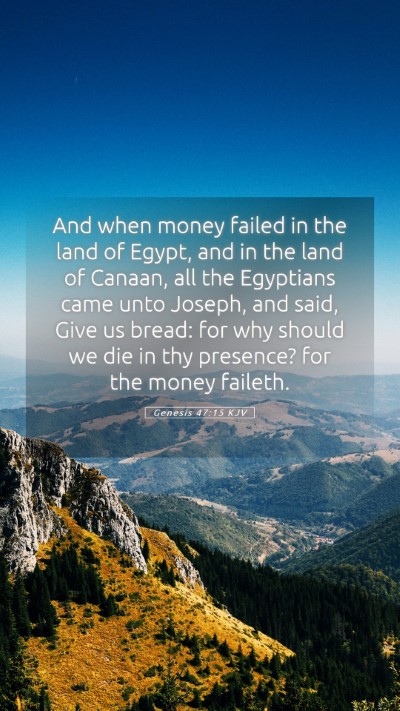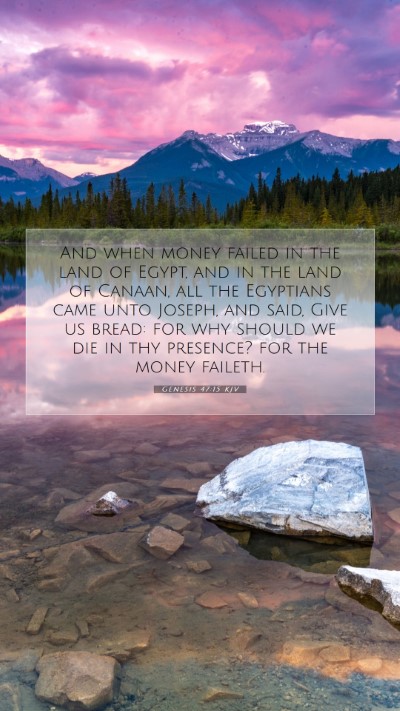Understanding Genesis 47:15
Genesis 47:15 provides a vital glimpse into the economic and sociopolitical dynamics during the time of Joseph in Egypt. This chapter marks a significant moment as Egypt faces a severe famine, which has implications for both the Israelites and the Egyptians. Here, we explore various Bible verse meanings, interpretations, and explanations based on insights from public domain commentaries.
Verse Text
Genesis 47:15 (KJV): “And when money failed in the land of Egypt, and in the land of Canaan, all the Egyptians came unto Joseph, and said, Give us bread: for why should we die in thy presence? for the money faileth.”
Context of the Verse
To grasp the importance of Genesis 47:15, one must consider the historical context. The region was experiencing a devastating famine, which compelled the Egyptians to seek Joseph’s assistance. Through this interpretation, we can better understand the significance of economic dependency and the providence of God in crises.
Commentary Insights
-
Matthew Henry:
Henry emphasizes the desperation of the Egyptians, illustrating how they turned to Joseph for sustenance. He notes that their plea signifies a critical moment when human resources were exhausted, aligning with the broader theme of reliance on divine provision during tribulation.
-
Albert Barnes:
Barnes elaborates on the concept of financial collapse, highlighting that the failure of money reflects not just the physical plight but also the spiritual and societal disarray. He argues that this situation foreshadows the need for spiritual nourishment beyond mere physical bread.
-
Adam Clarke:
Clarke provides a detailed commentary on the societal implications of this scene, suggesting that the Egyptians' desperation is indicative of a deeper existential crisis—fear of death and the quest for life-sustaining nourishment. He points out the importance of Joseph's role as a savior figure in this narrative.
Key Themes and Insights
The insights from these commentaries align to reveal several key themes associated with Genesis 47:15:
-
The Fragility of Economic Stability:
This verse serves as a reminder of how quickly material wealth can disappear, leaving individuals and nations vulnerable.
-
Human Dependence on God:
In times of need, true dependence on God emerges, showcasing the necessity of recognizing spiritual sustenance alongside physical needs.
-
The Role of Leadership:
Joseph’s leadership illustrates the importance of wise and compassionate governance, especially during crises, cementing his role as a protector of life amidst scarcity.
Application of the Verse
Genesis 47:15 can be applied in various aspects of contemporary life, particularly in discussions related to:
-
Economic Strategies:
Understanding financial sustainability within communities, and the balance between resources and needs.
-
Spiritual Nourishment:
Fostering a deeper relationship with God through prayer and community, especially when faced with personal challenges or societal issues.
-
Leadership Qualities:
Inspiring current leaders to emulate Joseph’s qualities of foresight, empathy, and responsibility during difficult times.
Cross References
Genesis 47:15 connects deeply with several other passages, reinforcing its messages:
- Genesis 41:30-31: The prophecy of famine.
- Genesis 42:6: Joseph's position as a provider.
- Exodus 16:3: The Israelites’ hunger in the wilderness.
Conclusion
In conclusion, the analysis of Genesis 47:15 sheds light on various aspects of human existence—economic uncertainty, spiritual dependency, and leadership during crises. The understanding of this verse is essential for deepening our Biblical exegesis and applications in modern life. Through engaging with diverse Bible study resources and tools, individuals can develop a comprehensive grasp of these vital scriptural insights.
This commentary not only elaborates on the transition from physical sustenance to spiritual sustenance but also serves as a lens through which to view the importance of faith and community in times of need. Ultimately, Genesis 47:15 calls us to reflect on our relationships with God, our leaders, and one another in the reality of shared struggles.


